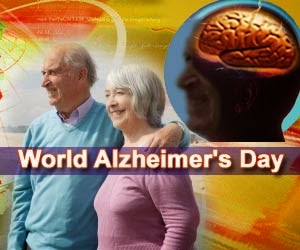World Alzheimer's Day 2014
Every
year on the 21st of September, Alzheimer associations across the globe
unite to recognize World Alzheimer's Day. Together, we are making small
but important strides toward increasing awareness and combating the
stigma.
The
theme for World Alzheimer's Month 2014 is ‘Dementia: Can we reduce the
risk?', focusing on ways we may be able to help reduce our risk of
developing dementia with brain healthy lifestyles.
Almost ten percent of adults above the age of 65 are affected by Alzheimer's and it is believed that the incidence and the rate of disease will increase with age and time.
What is Alzheimer's Disease?
Alzheimer's
is a degenerative disease of the nervous system where the patient
starts to lose their memory and in later cases even show behavioral
disorders and forgets their own identity. Dementia is the major symptom
of Alzheimer's disease where the person loses the activity of the brain
and the memory.Till now only symptomatic treatment are available for it
and neither the reason behind the disease or its progression is clearly
understood.
Let’s take a look at five ways you can reduce your risk of developing dementia
1. Look after your heart
Smoking, high blood pressure, high cholesterol, diabetes and obesity all damage the blood vessels and, increase the risk for having a stroke or a heart attack, and, it now seems likely, going on to develop dementia in later life. These problems can be prevented through healthy lifestyle choices, and treated effectively if they do occur.
2. Be physically active
Move more. Moderate to heavy exercise can decrease your risk of Alzheimer's by up to 45%. Moderate exercise includes house work, climbing stairs, and sports like bowling and golf. And start early -- exercising in your teens can protect you later in life.
Being fit has been show to decrease brain shrinkage, a common finding in dementia, and may help fight depression, which also commonly occurs in Alzheimer's disease patients. Aim for an hour per day, but every little bit adds up.
3. Follow a healthy diet
Food is fuel for both brain and body. A healthy, balanced diet can be of great help. Some evidence suggests that a Mediterranean-type diet, rich in cereals, fruits, fish, legumes and vegetables can help to reduce the risk of dementia. Also up your Vitamin E which is a very potent anti-oxidant. Omega 3 fatty acids found in fish is associated with a lower risk of Alzheimer's disease. DHA (docosahexaenoic acid), which is present in larger amounts in the brain, appears to be particularly important.
4. Challenge your brain
By challenging the brain with new activities you can help build new brain cells and strengthen the connections between them. This may counter the harmful effects of Alzheimer’s disease and other dementia pathologies. Learn some great new things, learn a new language or taking up a new hobby or sport, slove quiz, puzzles.
5. Enjoy social activities
Social engagement may also be beneficial to brain health because it stimulates our brain reserves, helping to reduce our risk of dementia and depression. Try and make time for friends and family, you can even combine your activities with physical and mental exercise through sport or other hobbies.
Make changes to your lifestyle today, and be consistent, to decrease your risk of Alzheimer's disease. All of the things mentioned above work much better for prevention than for slowing of progression or treatment.
Nutritionist and Diet Consultant
Founder Shilpsnutrilife - Diet and lifestylemakeover







No comments:
Post a Comment